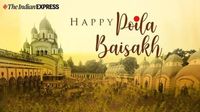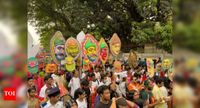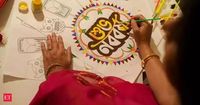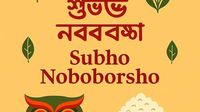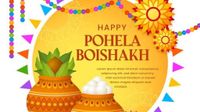Pohela Boishakh, also known as Poila Baisakh or Noboborsho, marks the joyous arrival of the Bengali New Year. In 2025, this vibrant festival will be celebrated on Tuesday, April 15, with the moment of Sankranti occurring at 3:30 AM on the previous day, April 14. The celebration is not only a date change but a cultural extravaganza filled with hope, joy, and tradition, especially prominent in West Bengal, Bangladesh, and among Bengali communities in Assam and Tripura.
The history of Pohela Boishakh can be traced back to the 7th century during the reign of King Shashanka of ancient Bengal. However, the Bengali calendar, as we know it today, underwent significant reforms under Mughal Emperor Akbar. He introduced changes to simplify the tax collection system, aligning the calendar with the agricultural cycle, which laid the foundation for celebrating Pohela Boishakh as the start of the Bengali New Year.
This year, celebrations will begin early in the morning, as people wake up to clean their homes, don new clothes, and visit temples to pray for a prosperous year ahead. In Kolkata, the streets will come alive with music, dance, and colorful processions, while families gather to enjoy traditional meals featuring fish curry, rice, and sweets such as rosogolla and mishti doi. The atmosphere is filled with the aroma of panta bhat (fermented rice) and ilish (hilsa fish), which are staples during the festivities.
In Bangladesh, Poila Boishakh is a national holiday celebrated with the Mangal Shobhajatra procession, where participants carry colorful masks and banners, showcasing the rich cultural heritage of the Bengali people. This event is a highlight of the day, filled with cultural events, fairs, and markets selling traditional crafts, making it a time of renewal and community bonding.
As families come together to welcome the new year, they exchange warm greetings, often saying "Shubho Noboborsho"—a wish for a happy new year. The day is also significant for business owners, who take this opportunity to inaugurate new ventures and begin fresh account books, symbolizing growth and renewal. The opening of new ledgers, known as Haal Khata, is accompanied by prayers to Lord Ganesha and Goddess Lakshmi, seeking blessings for prosperity and success.
Pohela Boishakh is not just a celebration of the new year; it embodies the essence of Bengali culture, bringing together people from various backgrounds to celebrate their shared heritage. The festival coincides with other regional celebrations across India, such as Baisakhi in Punjab, Vishu in Kerala, Puthandu in Tamil Nadu, and Bihu in Assam, showcasing the diverse tapestry of Indian culture.
As the new year approaches, many people send heartfelt wishes to their loved ones, hoping for peace, happiness, and prosperity. Messages such as "Wishing you a bright and beautiful Pohela Boishakh filled with good food and great vibes" and "May this year bring calm to your mind, strength to your spirit, and sweetness to your days" resonate with the spirit of renewal that accompanies the festival.
This year, the essence of Pohela Boishakh is captured in the warmth of family gatherings, the joy of cultural performances, and the delicious spread of traditional dishes. The celebration is a reminder of the importance of community, resilience, and the joy that comes with starting anew.
As we step into Bengali Year 1432, let us embrace the traditions that bind us and look forward to a year filled with opportunities and achievements. With every sunrise of Boishakh, there is a chance to start afresh, leaving behind the past and welcoming the promise of a better tomorrow. The rhythm of the dhak (traditional drum) and the simplicity of tradition inspire many to find strength and hope for the year ahead.
In conclusion, Pohela Boishakh is a time to celebrate life, light, and all things beautiful. It’s an occasion to reflect on our roots, cherish our relationships, and embrace the future with open hearts. As the Bengali New Year unfolds, may it bring joy that lasts all year and memories that we will cherish forever. Shubho Noboborsho!
